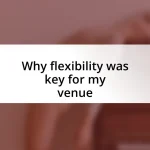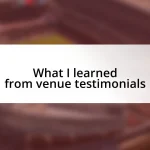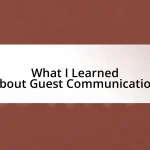Key takeaways:
- Understanding audience interests and values is crucial for selecting relevant guests who can engage meaningfully with attendees.
- Evaluating guest experience and adaptability enhances event quality, ensuring speakers connect well with the audience.
- Implementing a clear guest selection process with a scoring system and timeline reduces stress and increases event effectiveness.
- Continuous feedback post-event helps refine guest selection strategies, fostering improvements and alignment with audience preferences.

Understanding Guest Selection Criteria
When it comes to selecting guests, I often find myself reflecting on the qualities that truly make a meaningful impact. I can still remember hosting a panel discussion where I invited a diverse group of experts, and the richness of their varied perspectives sparked such engaging conversations. Isn’t it fascinating how the right mix of backgrounds and experiences can elevate an event from ordinary to unforgettable?
Another critical aspect of guest selection is aligning with the audience’s interests and expectations. For instance, I once overlooked this and invited a guest who was brilliant but didn’t quite resonate with the crowd. It was an eye-opener for me! I realized then that understanding your audience not only shapes the guest list but also ensures that the conversations felt relevant and connected. Have you ever had a moment like that, where the guest just didn’t quite hit the mark?
Finally, I find that personal rapport can make a significant difference in guest selection. In my experience, when I’ve connected personally with potential guests, it often led to more authentic interactions during the event. I remember a time when I reached out to a speaker just to have a chat before the event, and that simple step built a genuine connection that translated to magic on stage. Don’t you think that personal touch can turn a good event into something truly memorable?

Identifying Your Ideal Guest Profile
Identifying your ideal guest profile starts with understanding the core values and interests of both the guests and your audience. I’ve found that creating a guest persona helps clarify this process. For example, when I hosted a food-related event, I outlined guests who not only had culinary expertise but also a passion for sustainable practices. This focus resulted in discussions that resonated deeply with attendees, sparking not only intrigue but a genuine connection to the topic.
It’s also essential to consider how a potential guest’s background complements the event’s purpose. I once invited a tech entrepreneur to speak at a business seminar, assuming his success was enough. However, his expertise clashed with the theme of local community development. The result? A disengaged audience and a missed opportunity to explore meaningful insights. Learning from that experience has taught me that aligning guest expertise with event goals is crucial to creating an engaging atmosphere.
Finally, don’t underestimate the power of personality in your guest profile. I distinctly remember choosing a guest who had a fantastic resume but lacked charisma. The energy just wasn’t there, and it showed. Since then, I prioritize a guest’s ability to connect with the audience emotionally. It’s those moments of laughter and shared stories that truly elevate an event, making it memorable long after it’s over.
| Aspect | Considerations |
|---|---|
| Core Values | Align guest persona with audience interests. |
| Background | Ensure guest expertise matches event goals. |
| Personality | Choose guests who can connect emotionally with the audience. |
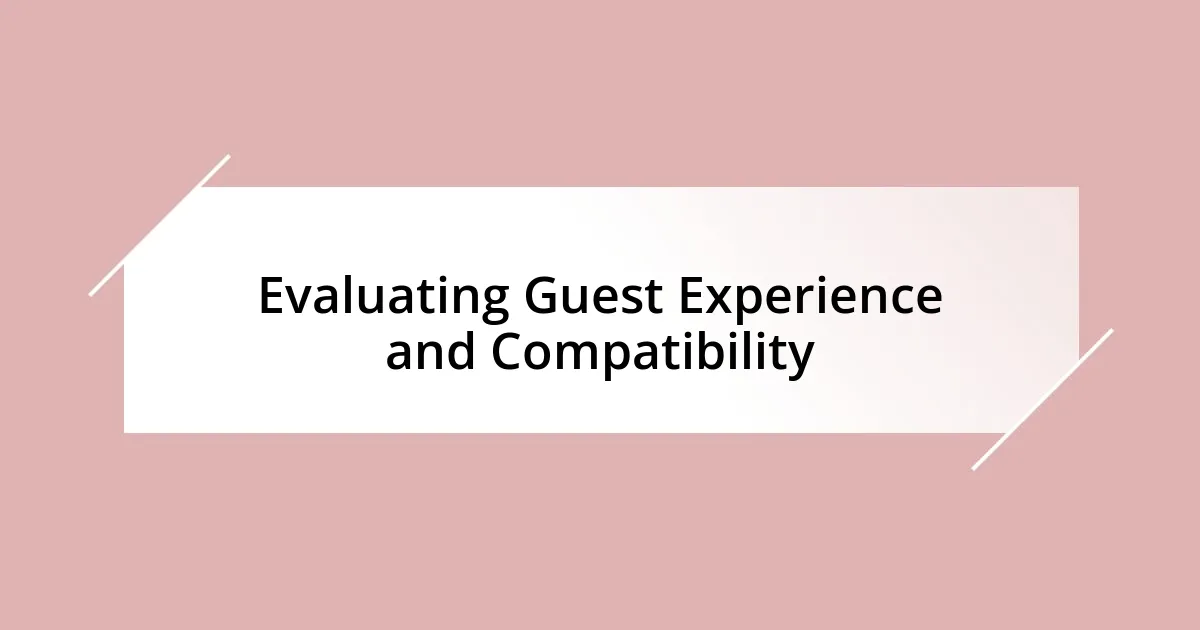
Evaluating Guest Experience and Compatibility
Evaluating guest experience and compatibility is a nuanced endeavor that invariably shapes the outcome of an event. From my own experiences, I can attest that a guest’s prior engagement in similar settings can be a game-changer. For instance, I had a seasoned panelist who not only understood the dynamics of our audience but thrived in addressing questions relevant to their concerns. It made the discussion feel more like a conversation rather than a presentation, fostering a genuine connection.
When I assess compatibility, I often compile a checklist of essential factors:
– Past Experiences: Has the guest previously spoken at similar events, and what was the feedback?
– Audience Connection: Can the guest relate to the audience’s interests and values?
– Collaborative Spirit: Is the guest open to engaging in dialogue rather than simply presenting information?
– Adaptability: How well does the guest respond to audience dynamics during live events?
In evaluating these elements, I reflect on specific instances, such as when I invited a guest who had extensive experience but struggled with adapting to real-time audience reactions. It was a learning moment for me, highlighting the importance of selecting guests who not only possess expertise but also the ability to vibe with the crowd.
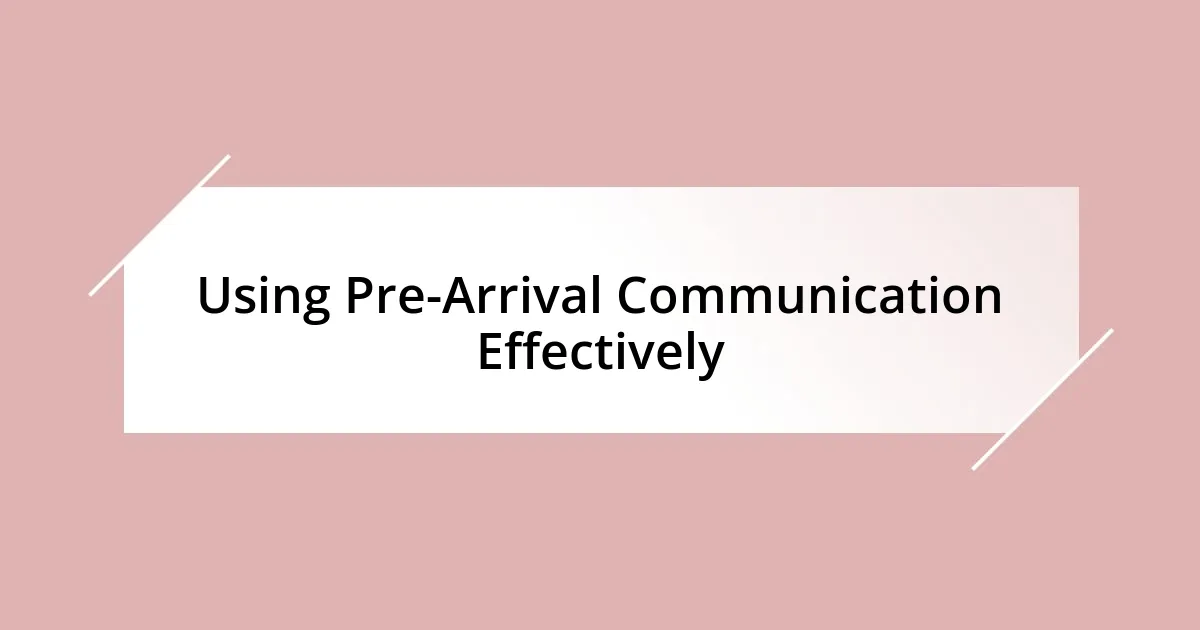
Using Pre-Arrival Communication Effectively
Effective pre-arrival communication can set the stage for a successful event. I like to create an engaging experience even before guests step through the door. For instance, I once sent out personalized emails that included not only event details but also tailored content about the guest who would be speaking. This simple gesture ignited anticipation among attendees and fostered a sense of connection long before the event began.
In my experience, consistent check-ins as the event approaches can make guests feel valued and prepared. I recall one situation where I reached out to a guest a week prior, offering resources related to our theme. The guest expressed gratitude and even incorporated some of that material into his talk, which enhanced the relevance and credibility of his presentation. Isn’t it incredible how a little communication can transform the guest experience?
Moreover, I’ve found that clarifying logistics is essential to making guests comfortable. One time, I neglected to mention parking arrangements to a speaker, leading to confusion and stress on their arrival. Since then, I’ve made it a rule to provide comprehensive details—parking, access points, and even local recommendations—well in advance. It’s all about creating an inviting atmosphere that allows everyone to focus on what truly matters: the event itself.
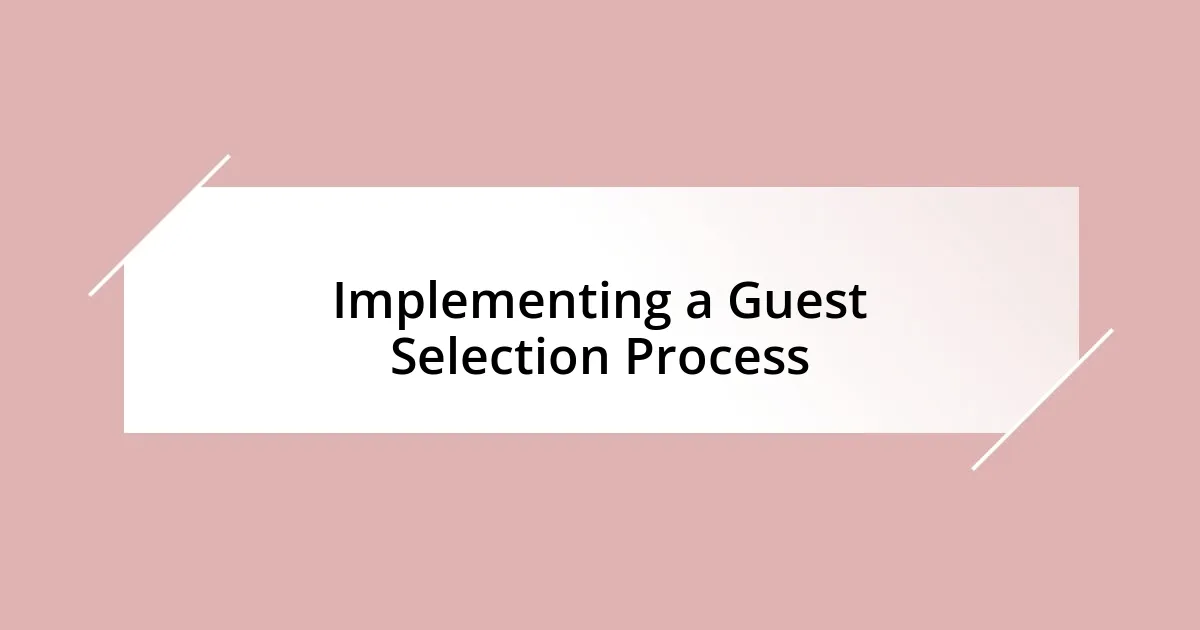
Implementing a Guest Selection Process
Creating a guest selection process that flows well is essential to ensure a cohesive event. I’ve learned that clarity is key. When I sit down to outline who I want to invite, I categorize guests based on their expertise, past performances, and how well they mesh with the event’s goals. It’s a bit like putting together a puzzle; every piece needs to fit just right to create a beautiful picture. Have you ever felt the satisfaction of finding that perfect piece? It’s the same rush when assembling a lineup that excites both the guests and the audience.
Moreover, I find it beneficial to create a scoring system to objectively evaluate each potential guest. It might sound tedious, but trust me, it immensely reduces the stress of decision-making. For example, I remember a time when I compared two fantastic speakers side-by-side using scores based on their previous experiences and audience engagement levels. In the end, the higher-scoring candidate not only delivered an incredible presentation but also connected on a personal level with the audience, leaving everyone buzzing with excitement. Who wouldn’t want that for their event?
Implementing a timeline helps maintain momentum throughout the selection process. I once made the mistake of delaying guest confirmations, which led to a last-minute scramble that impacted the event’s overall vibe. Now, I establish deadlines for inviting guests and stick to them, allowing for follow-ups and accommodating anyone who might need more time. It’s amazing how a well-structured timeline can create anticipation not just for me, but for the guests as well. It’s like setting the stage for a performance; everyone can feel the energy building!
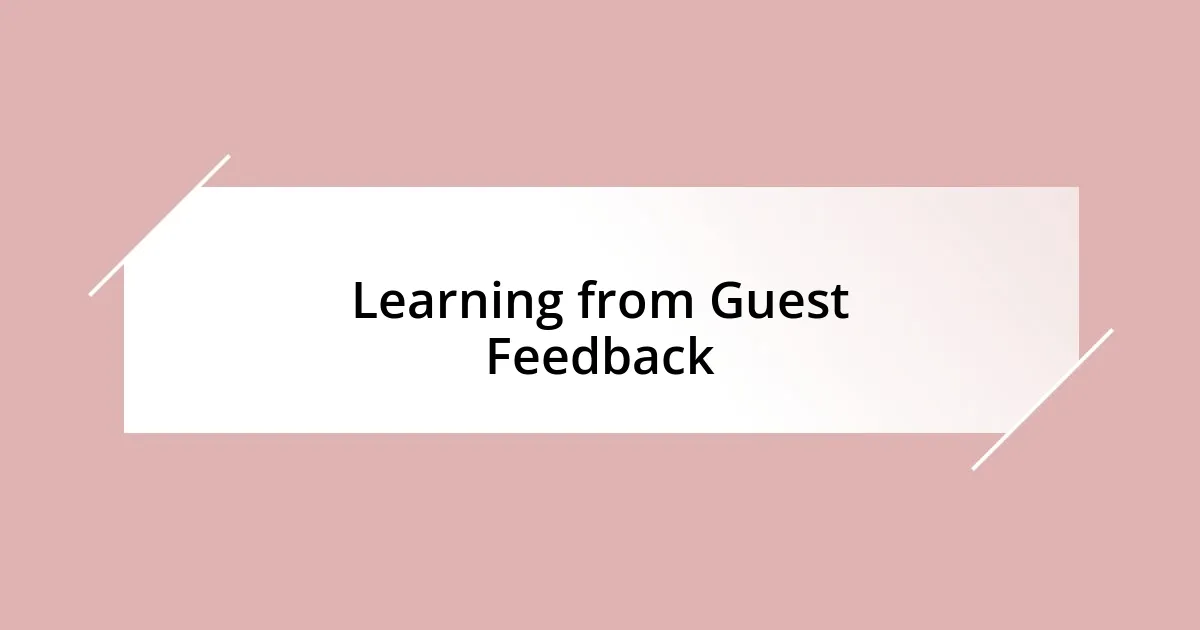
Learning from Guest Feedback
Learning from guest feedback is invaluable. After each event, I make it a point to reach out to attendees for their thoughts and experiences. One time, a guest shared that they felt overwhelmed by the schedule. This insight prompted me to consider reworking the agenda to allow for more breaks. Could it be that a more relaxed atmosphere fosters better connections and engagement? I believe it can.
Another aspect I focus on is specific comments about guest speakers. I once received feedback praising a speaker’s storytelling but critiquing their excessive technical jargon. Recognizing this has led me to encourage speakers to balance information with accessibility. Our audience’s comfort matters, and I want them to feel included in every narrative. Isn’t it fulfilling when every attendee walks away feeling empowered and connected?
I’ve also experimented with post-event surveys, and I can tell you—they’ve been a game changer. By asking tailored questions, I’ve discovered trends that have shaped future selections. For instance, a recurring theme in responses was a desire for more interactive sessions. Acting on that feedback, I’ve incorporated Q&A segments or small group discussions, making previous attendees feel excited about returning. Have you ever noticed how a small tweak based on feedback can radically change the guest experience? It’s profound.

Adjusting Your Strategy Over Time
After reflecting on my guest selection journey, I’ve realized that flexibility is crucial. Over time, I’ve noticed that audience preferences can shift unexpectedly. I remember one event where I initially prioritized industry veterans as speakers, but after a few sessions, I found the audience craving fresh, innovative voices. Recognizing this shift allowed me to adapt my strategy, inviting emerging thought leaders who brought a vibrant, contemporary perspective that truly resonated.
Incorporating trends and feedback has also played a significant role in my adjustments. For example, when I observed a growing interest in sustainability, I actively sought out speakers who focused on eco-friendly practices. This small adjustment not only made my events more relevant but sparked passionate discussions that engaged the audience deeply. Isn’t it amazing how aligning with current interests can breathe new life into your events?
I’ve come to appreciate the rhythm of continuous improvement. Each time I refine my approach, it feels like I’m unlocking new potential. Recently, I experimented with a buddy system for guest selection, pairing seasoned speakers with newcomers. The unexpected synergy not only enriched the experience but also fostered mentorship among guests. Have you ever noticed how collaboration can elevate a standard event into something memorable? That’s the kind of magic I strive for in every gathering.




